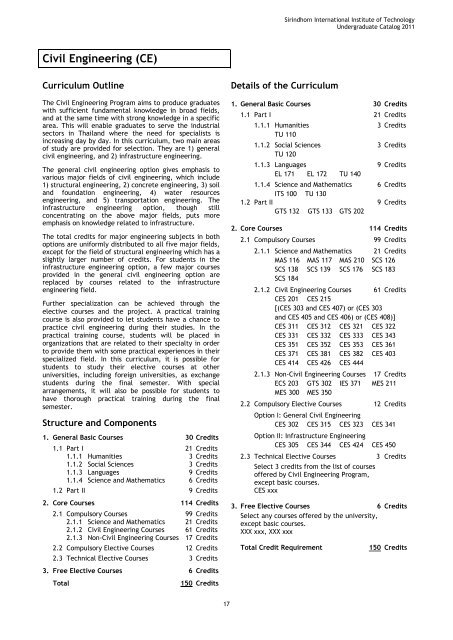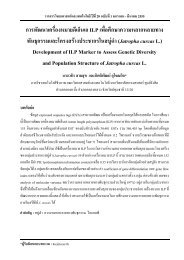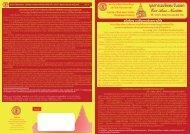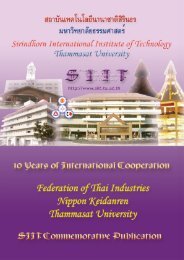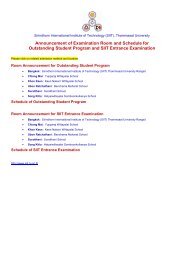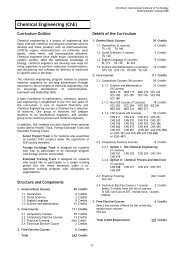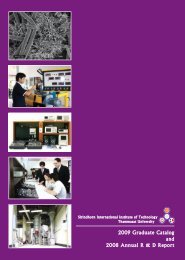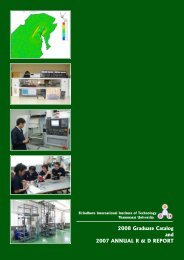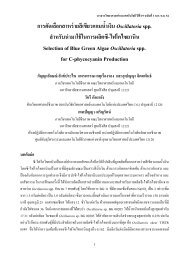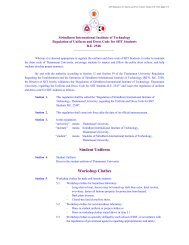Undergraduate Catalog, Academic Year 2011 - Sirindhorn ...
Undergraduate Catalog, Academic Year 2011 - Sirindhorn ...
Undergraduate Catalog, Academic Year 2011 - Sirindhorn ...
Create successful ePaper yourself
Turn your PDF publications into a flip-book with our unique Google optimized e-Paper software.
<strong>Sirindhorn</strong> International Institute of Technology<br />
<strong>Undergraduate</strong> <strong>Catalog</strong> <strong>2011</strong><br />
Civil Engineering (CE)<br />
Curriculum Outline<br />
The Civil Engineering Program aims to produce graduates<br />
with sufficient fundamental knowledge in broad fields,<br />
and at the same time with strong knowledge in a specific<br />
area. This will enable graduates to serve the industrial<br />
sectors in Thailand where the need for specialists is<br />
increasing day by day. In this curriculum, two main areas<br />
of study are provided for selection. They are 1) general<br />
civil engineering, and 2) infrastructure engineering.<br />
The general civil engineering option gives emphasis to<br />
various major fields of civil engineering, which include<br />
1) structural engineering, 2) concrete engineering, 3) soil<br />
and foundation engineering, 4) water resources<br />
engineering, and 5) transportation engineering. The<br />
infrastructure engineering option, though still<br />
concentrating on the above major fields, puts more<br />
emphasis on knowledge related to infrastructure.<br />
The total credits for major engineering subjects in both<br />
options are uniformly distributed to all five major fields,<br />
except for the field of structural engineering which has a<br />
slightly larger number of credits. For students in the<br />
infrastructure engineering option, a few major courses<br />
provided in the general civil engineering option are<br />
replaced by courses related to the infrastructure<br />
engineering field.<br />
Further specialization can be achieved through the<br />
elective courses and the project. A practical training<br />
course is also provided to let students have a chance to<br />
practice civil engineering during their studies. In the<br />
practical training course, students will be placed in<br />
organizations that are related to their specialty in order<br />
to provide them with some practical experiences in their<br />
specialized field. In this curriculum, it is possible for<br />
students to study their elective courses at other<br />
universities, including foreign universities, as exchange<br />
students during the final semester. With special<br />
arrangements, it will also be possible for students to<br />
have thorough practical training during the final<br />
semester.<br />
Structure and Components<br />
1. General Basic Courses 30 Credits<br />
1.1 Part I 21 Credits<br />
1.1.1 Humanities 3 Credits<br />
1.1.2 Social Sciences 3 Credits<br />
1.1.3 Languages 9 Credits<br />
1.1.4 Science and Mathematics 6 Credits<br />
1.2 Part II 9 Credits<br />
2. Core Courses 114 Credits<br />
2.1 Compulsory Courses 99 Credits<br />
2.1.1 Science and Mathematics 21 Credits<br />
2.1.2 Civil Engineering Courses 61 Credits<br />
2.1.3 Non-Civil Engineering Courses 17 Credits<br />
2.2 Compulsory Elective Courses 12 Credits<br />
2.3 Technical Elective Courses 3 Credits<br />
Details of the Curriculum<br />
1. General Basic Courses 30 Credits<br />
1.1 Part I 21 Credits<br />
1.1.1 Humanities 3 Credits<br />
TU 110<br />
1.1.2 Social Sciences 3 Credits<br />
TU 120<br />
1.1.3 Languages 9 Credits<br />
EL 171 EL 172 TU 140<br />
1.1.4 Science and Mathematics 6 Credits<br />
ITS 100 TU 130<br />
1.2 Part II 9 Credits<br />
GTS 132 GTS 133 GTS 202<br />
2. Core Courses 114 Credits<br />
2.1 Compulsory Courses 99 Credits<br />
2.1.1 Science and Mathematics 21 Credits<br />
MAS 116 MAS 117 MAS 210 SCS 126<br />
SCS 138 SCS 139 SCS 176 SCS 183<br />
SCS 184<br />
2.1.2 Civil Engineering Courses 61 Credits<br />
CES 201 CES 215<br />
[(CES 303 and CES 407) or (CES 303<br />
and CES 405 and CES 406) or (CES 408)]<br />
CES 311 CES 312 CES 321 CES 322<br />
CES 331 CES 332 CES 333 CES 343<br />
CES 351 CES 352 CES 353 CES 361<br />
CES 371 CES 381 CES 382 CES 403<br />
CES 414 CES 426 CES 444<br />
2.1.3 Non-Civil Engineering Courses 17 Credits<br />
ECS 203 GTS 302 IES 371 MES 211<br />
MES 300 MES 350<br />
2.2 Compulsory Elective Courses 12 Credits<br />
Option I: General Civil Engineering<br />
CES 302 CES 315 CES 323 CES 341<br />
Option II: Infrastructure Engineering<br />
CES 305 CES 344 CES 424 CES 450<br />
2.3 Technical Elective Courses 3 Credits<br />
Select 3 credits from the list of courses<br />
offered by Civil Engineering Program,<br />
except basic courses.<br />
CES xxx<br />
3. Free Elective Courses 6 Credits<br />
Select any courses offered by the university,<br />
except basic courses.<br />
XXX xxx, XXX xxx<br />
Total Credit Requirement<br />
150 Credits<br />
3. Free Elective Courses 6 Credits<br />
Total<br />
150 Credits<br />
17


